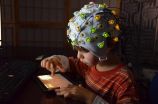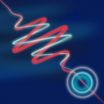Neuroscientists identify brain mechanisms that predict generosity in children
2014-12-19
(Press-News.org) University of Chicago developmental neuroscientists have found specific brain markers that predict generosity in children. Those neural markers appear to be linked to both social and moral evaluation processes.
There are many sorts of prosocial behaviors. Although young children are natural helpers, their perspective on sharing resources tends to be selfish. Jean Decety, the Irving B. Harris Professor of Psychology and Psychiatry, and Jason Cowell, a postdoctoral scholar in Decety's Child NeuroSuite lab, wanted to find out how young children's brains evaluate whether to share something with others out of generosity. In this study, generosity was used as a proxy for moral behavior. The paper is published online by Current Biology and will appear in the Jan. 5, 2015 issue.
"We know that generosity in children increases as they get older," said Decety. He added that neuroscientists have not yet examined the mechanisms that guide the increase in generosity. "The results of this study demonstrate that children exhibit both distinct early automatic and later more controlled patterns of neural responses when viewing scenarios showing helping and harmful behaviors. It's that later more controlled neural response that is predictive of generosity."
The study included recording brain waves by EEG and eye tracking of 57 children, ages three to five, while they viewed short animations depicting prosocial and antisocial behaviors of cartoon-like characters helping or hurting each other. Following that testing, the children played a modified version of a scenario called the "dictator game." The children were given ten stickers and were told that the stickers were theirs to keep. They were then asked if they wanted to share any of their stickers with an anonymous child who was to come to the lab later that day.
The children had two boxes, one for themselves and one for the anonymous child. In an effort to prevent bias, the experimenter turned around while the child decided whether or how much to share. On average, the children shared fewer than two stickers (1.78 out of 10) with the anonymous child. There was no significant difference in sharing behavior by gender or age. The authors also found that the nature of the animations the children watched at the outset could influence the children's likelihood of behaving in a generous way.
The study shows how young children's brains process moral situations presented in these scenarios and the direct link to actual prosocial behavior in the act of generosity by sharing the stickers. "The results shed light on the theory of moral development by documenting the respective contribution of automatic and cognitive neural processes underpinning moral behavior in children," Decety concluded in the paper.
The developmental scientists found evidence from the EEG that the children exhibited early automatic responses to morally laden stimuli (the scenarios) and then reappraised the same stimuli in a more controlled manner, building to produce implicit moral evaluations.
"This is the first neuro-developmental study of moral sensitivity that directly links implicit moral evaluations and actual moral behavior, and identifies the specific neuro markers of each," said Decety. "These findings provide an interesting idea that by encouraging children to reflect upon the moral behavior of others, we may be able to foster sharing and generosity in them." Decety added that these findings show that, contrary to several predominant theories of morality, while gut reactions to the behavior of others do exist, they are not associated with one's own moral behavior, as in how generous the children were with their stickers.
Decety and Cowell are now conducting similar work with even younger children, ages 12 to 24 months, to look at when these neural markers for generosity emerge.
INFORMATION:
[Attachments] See images for this press release:

ELSE PRESS RELEASES FROM THIS DATE:
2014-12-19
Australian scientists have developed a model for oil palm cultivation, aimed at helping growers of the crop maximize the yields of their plantations, while minimizing detrimental environmental impacts.
The model was recently published in the journal Environmental Modeling & Software.
"Oil palm has become a major crop in the tropics, cultivated on more than 39 million acres of land," co-author Dr Paul Nelson of James Cook University (JCU) said.
"Demand for the product continues to grow, and the industry is expected to keep expanding in the foreseeable future.
"At ...
2014-12-19
Scientists at A*STAR's Institute of Medical Biology (IMB) and Institute of Molecular and Cellular Biology (IMCB) have identified a genetic pathway that accounts for the extraordinary size of the human brain. The team led by Dr Bruno Reversade from A*STAR in Singapore, together with collaborators from Harvard Medical School, have identified a gene, KATNB1, as an essential component in a genetic pathway responsible for central nervous system development in humans and other animals.
By sequencing the genome of individuals of normal height but with a very small head size, ...
2014-12-19
Here's a nice surprise: quantum physics is less complicated than we thought. An international team of researchers has proved that two peculiar features of the quantum world previously considered distinct are different manifestations of the same thing. The result is published 19 December in Nature Communications.
Patrick Coles, Jedrzej Kaniewski, and Stephanie Wehner made the breakthrough while at the Centre for Quantum Technologies at the National University of Singapore. They found that 'wave-particle duality' is simply the quantum 'uncertainty principle' in disguise, ...
2014-12-19
Misfiring of the brain's control system might underpin compulsions in obsessive-compulsive disorder (OCD), according to researchers at the University of Cambridge, writing in the American Journal of Psychiatry.
The research, led by Dr Claire Gillan and Professor Trevor Robbins (Department of Psychology) is the latest in a series of studies from the Cambridge Behavioural and Clinical Neuroscience Institute investigating the possibility that compulsions in OCD are products of an overactive habit-system. This line of work has shifted opinion away from thinking of OCD as ...
2014-12-19
The memory and walking speeds of adults who have lost all of their teeth decline more rapidly than in those who still have some of their own teeth, finds new UCL research.
The study, published in the Journal of the American Geriatrics Society, looked at 3,166 adults aged 60 or over from the English Longitudinal Study of Ageing (ELSA) and compared their performance in tests of memory and walking speed. The results showed that the people with none of their own teeth performed approximately 10% worse in both memory and walking speed tests than the people with teeth.
The ...
2014-12-19
Hormone replacement therapy (HRT) is the most effective treatment for menopausal symptoms, in particular for younger women at the onset of the menopause, suggests a new review published today (19 December) in The Obstetrician & Gynaecologist (TOG).
The review highlights that menopausal symptoms, including hot flushes and night sweats are common, affecting around 70% of women for an average of 5 years but may continue for many years in about 10% of women.
Every woman experiences the menopause differently; some experience one or two symptoms mildly while others have ...
2014-12-19
Less than half of UK prescriptions for antipsychotic drugs are being issued to treat the serious mental illnesses for which they are mainly licensed, reveals research published in the online journal BMJ Open.
Instead, they may often be prescribed 'off label' to older people with other conditions, such as anxiety and dementia, despite the greater risk of potentially serious side effects in this age group, the findings indicate.
The researchers analysed family doctors' prescribing patterns for first and second generation antipsychotic drugs across the UK between 2007 ...
2014-12-19
Almost half of teen drivers killed on US roads in the past few years were driving vehicles that were 11 or more years old, and often lacking key safety features, reveals research published online in Injury Prevention.
Parents, who are usually the ones stumping up for a car, could be putting their children's lives at risk by focusing on cost, warn the researchers.
The prevalence of fatal road traffic collisions among US teens has fallen sharply since 1996. Yet per mile driven, rates of police-reported and fatal crashes involving teens are around three times those for ...
2014-12-19
A study of more than 80,000 women has uncovered different risks of developing type 2 diabetes associated with different blood groups, with the biggest difference a 35% increased risk of type 2 diabetes found in those with group B, Rhesus factor positive (R+) blood compared with the universal donor group O, Rhesus factor negative (R-). The study is published in Diabetologia (the journal of The European Association for the Study of Diabetes) and is by Dr Guy Fagherazzi, and Dr Françoise Clavel-Chapelon, Center for Research in Epidemiology and Population Health, INSERM, ...
2014-12-19
A Ugandan doctor, who contracted Ebola in Sierra Leone, survived after being flown to Germany for aggressive treatment involving a new drug under clinical development for vascular leakage [1]. Dr Timo Wolf and colleagues, from University Hospital Frankfurt in Germany, detail the successful intensive-care treatment the doctor received under biosafety level 4 conditions in an Article published in The Lancet.
On 28 September, 2014, the 38-year old doctor, who was in charge of an Ebola virus treatment unit in Lakka, Sierra Leone, developed a fever and diarrhoea. He tested ...
LAST 30 PRESS RELEASES:
[Press-News.org] Neuroscientists identify brain mechanisms that predict generosity in children

